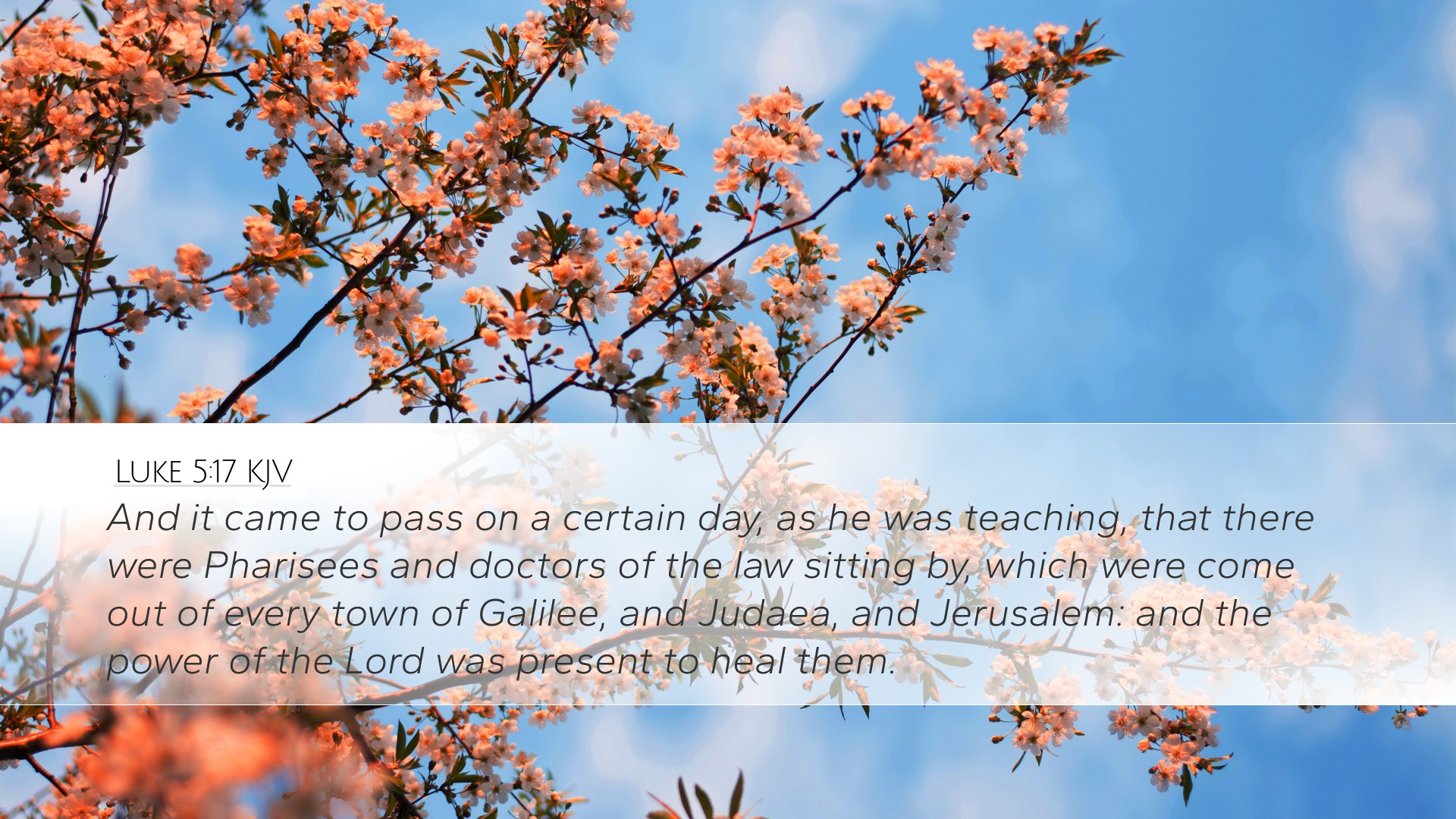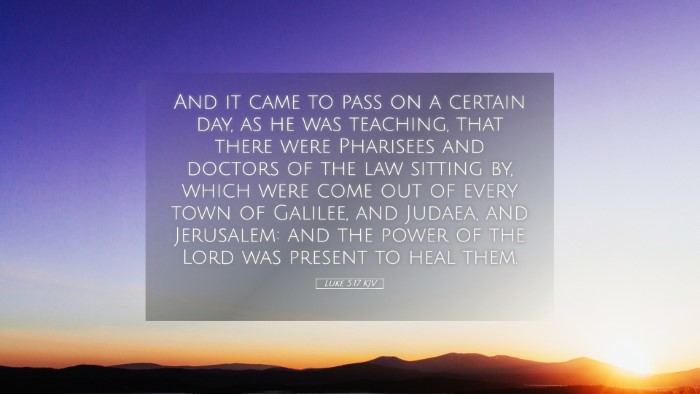Commentary on Luke 5:17
Verse: "And it came to pass on a certain day, as he was teaching, that there were Pharisees and doctors of the law sitting by, which were come out of every town of Galilee, and Judea, and Jerusalem: and the power of the Lord was present to heal them."
Introduction
The occasion depicted in Luke 5:17 provides rich theological insights that resonate deeply with pastors, students, theologians, and Bible scholars.
This verse marks a significant moment in Jesus' ministry, bringing forth themes of authority, community, divine presence, and healing that deserve careful examination. The context of this passage reveals not only the socio-religious dynamics of the time but also serves as a precursor to significant events in Christ's life and mission.
Contextual Analysis
As Luke often emphasizes, Jesus' teachings occurred in various settings, highlighting the diverse audiences responding to His message. In this instance, the engagement of Pharisees and law experts reflects a critical intersection of religious authority and divine revelation.
- The Setting: The phrase "on a certain day" implies the ordinariness of the time contrasted with the extraordinary nature of the event. It invites readers to understand that divine encounters can occur unexpectedly.
- The Audience: The presence of Pharisees and doctors of the law underscores the serious examination Jesus faced from religious authorities, indicating the weight of His teachings and the challenges ahead.
- Geographical References: Locating these figures "from every town of Galilee, Judea, and Jerusalem" illustrates the profound influence of Jesus' ministry extending beyond local borders, emphasizing His widespread acclaim and scrutiny.
Theological Insights
This verse lays bare the tension between tradition and the new teachings of Jesus, presenting an opportunity for deep theological reflection on faith, healing, and authority.
- The Power of the Lord: The declaration "the power of the Lord was present to heal them" is a profound affirmation of God's capacity to heal—not just physically but spiritually. This notion of divine power speaks to the purpose of Christ’s ministry as a transformative force.
- Teaching and Healing: Interestingly, teaching precedes healing in this context. It illustrates the principle that spiritual enlightenment often precedes physical restoration. This underscores the holistic view of salvation that combines the physical, emotional, and spiritual dimensions of health.
- Presence of Faith: The phrase evokes a sense of divine readiness and expectation. The power of God was present, but it also suggests the necessity of faith for healing—a recurring theme in Jesus' ministry, where faith often catalyzes the miracle.
Commentary Insights
Drawing from the insights of Matthew Henry, Albert Barnes, and Adam Clarke, we see differing but complementary perspectives on this verse.
- Matthew Henry: He emphasizes the significance of Jesus' mission and the divine authority He exemplified in teaching and healing. Henry articulates that the presence of esteemed religious figures showcases both the admiration and scrutiny Jesus garnered, illustrating the complexities of His ministry.
- Albert Barnes: Barnes examines the cultural implications of the gathering, noting that the presence of Pharisees and law experts is indicative of the religious climate. He emphasizes that the power of the Lord indicates an active presence of divine will, ready to engage with the people.
- Adam Clarke: Clarke delves into the implications of "the power of the Lord" as being an indicative reference to divine intention for healing. He highlights that healing as a demonstration of compassion affirms the merger of word and deed—what Jesus proclaimed was evident in His actions.
Application
In light of these observations, Luke 5:17 offers several timeless applications pertinent for today's church and individual believers:
- Expectancy in Worship: Just as the power of God was present in Jesus' teaching, believers today should likewise foster an expectant heart in worship, anticipating divine encounters that lead to healing and transformation.
- Importance of Teaching: Pastoral leaders should emphasize the integral role of teaching in their ministries. The combination of sound theology and practical application is vital for nurturing a healthy faith community.
- Faith and Action: The call for faith as a precursor to healing challenges contemporary believers to actively engage in their faith, embracing both the teachings of Jesus and the works that flow from them.
Conclusion
Luke 5:17 is not just a narrative account; it is a rich tapestry of theological motifs woven together by the elements of divine authority, community engagement, and the healing presence of God.
It invites followers of Christ to reflect on the nature of faith, the significance of divine presence, and the holistic approach to ministry that encompasses teaching, healing, and the transformation of lives. As we delve into this verse, may we find renewed vigor in both the proclamation of the Gospel and the practice of love and healing in our communities.


